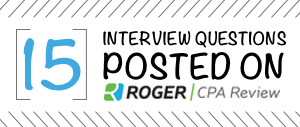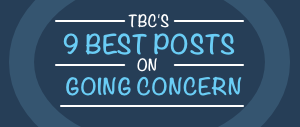From the mailbag:
Hi Andrew,
I was thinking about starting my own business part time, nothing to compete with my current accounting job, but I was wondering how you communicated to your managers that you were starting The Bean Counter.
I have a fairly strict conflict of interest’s policy I have to sign and I don’t really want my manager’s to know everything I do outside of work. I feel that it’s none of their business as long as I am putting in 100% effort and do not have a conflict of interest. I also don’t want to be passed over for promotion because I am not “focused”.
Would you maybe share your thoughts on building The Bean Counter? Why you started it and how you explained it to your managers as you were building it? Did you build it while you were still at PwC?
Some questions I’d love to hear answered:
- How long did it take you to have The Bean Counter replace your income?
- What motivated you?
- What was the hardest to learn?
- How do you motivate yourself?
Thanks Andrew and I love your site, keep up the good work!!!
While this is a lot to cover, I get this question a lot! Too many accountants don’t realize the incredible opportunity they have right in front of them without quitting their job and without getting fired!
I remember when I first quit my job; I told Amber Setter I wanted to replace my income in a year. She said:
“Why just replace you income?”
And she was right. I was thinking too small. I’m glad she changed my mindset and helped me think BIGGER.
I’m going to answer each of these questions above with a bit of detail. I want this post to help you if you are thinking of starting a side-business or eventually going full-time on your own.
My two biggest pieces of advice would be:
1) Save AT LEAST 1 years’ salary in the bank before you quit your job.
2) Build up a proven side business before quitting. Quit when you have a plan to surpass your previous income in 3-6 months.
I did neither of these.
When I quit, I have $50,000 in debt, a little bit of savings, no income, and didn’t start a business when I worked at PwC. That being said, if you meet steps 1 and 2 above, you’ll be able to do a far better job than I did my first year as an entrepreneur!
Why did you start The Bean Counter?
I asked myself a simple question? If I had to start talking today and not stop for 7 days straight, what could I talk the most about?
Accounting.
Specifically, how and why I got my job at PwC. Why I was promoted a year early. Why I worked on client proposals to Fortune 1000 companies. What it was like working on a Fortune 100 company.
In essence, my life for the last 5 years has been in accounting. I was great at my job and I had a lot to say!
I’d always been a huge fan of podcasting and so I started The Bean Counter Podcast. Now it’s evolved into a blog, videos, courses, and so much more!
At PwC, people knew me. Outside, I was nobody. I thought an online personal brand would help me build connections and stay in touch with the industry. I was right.
How did you tell your managers you were starting The Bean Counter?
I quit.
As I said above I wouldn’t recommend that. I think you should try and build up a proven side business before quitting.
If I were working at a firm and wanted to start a business, I wouldn’t tell anyone at first.
Here’s why:
You don’t know what you will like until you try it. Don’t get permission before you start. Experiment with a few things. Once you’ve found something that:
- You have the skills and ability to do
- You enjoy doing and have a passion for
- You are committed to it for the foreseeable future
Then you can tell management if you want. Before then, you’re just experimenting. To tell management before you start would be pre-emptive.
What if you get a venture approved, and 60 days later, you’re onto something else? Then you’re just wasting everyone’s time.
This process takes months even years! I’ve started about 10 small businesses in my life and 8 or so have completely failed.
Once you find something you love and are committing to for the foreseeable future, tell you HR department if you feel like you have to.
Otherwise, if you are still giving 100% at work, I’d keep it to yourself.
Do you think everyone that sells bakery items on the weekend or has rental properties gets it approved by management? No.
You really don’t have to either. If it’s not affecting your work, keep it to yourself. No one will care.
How long did it take you to have The Bean Counter replace your income?
Quicker than you might think, but it was scary. When I left PwC, I was making a $64,000/yr salary plus bonuses.
In the 12 months after leaving PwC, I made a little over $100,000. But it wasn’t all from The Bean Counter. I started another business Ten Key Heroes, wrote for a variety of news publications, and I worked as a contractor for a few accounting firms.
With income, the biggest thing I can say is: Forget your pride and get scrappy.
Yes, you are an entrepreneur. But you don’t deserve anything! In the early days, do whatever you can to keep yourself afloat. Working on the side as an accounting contractor can be great!
If you work a busy season, you can make 75% of an employee’s annual income in just 3 months!
What motivated you?
I’ve always had a bit of a renegade mentality and I’ve always had problems with authority. While I know how to get what I want in large organizations and companies, I like being independent and only relying on myself.
It’s just part of who I am.
I also spent a summer working for a startup in Singapore in 2011. That changed my view forever. If you’ve never worked for a startup, it’s hard to explain. Incredible opportunity mixed with probable failure and most people not knowing what they’re doing. Very exciting!
What was the hardest to learn?
To relax and be patient. As Rod Drury CEO of Xero said, “You can learn any skill in a year”.
The biggest hurdle in entrepreneurship is YOU! If you can get out of your own way and learn to frolick, experiment, goof off, fail, be weird, act out, push the limits, you will dominate.
But it’s when the constant fear, doubt, anxiety creep in that holds you back and crushes your soul.
How do you motivate yourself?
I think of my wife and family (no kids but maybe one day). I want to ease into my old age working on things I’m passionate about (and find meaningful) making a great living doing.
I’m interested in a lot of things. Accounting is one. Blogging is another. And there are probably 15-20 more I’ll experiment with before it’s all said and done.
I only get one life. I don’t want to get to the end and wish I did all the things I was interested in over the years. So I’m starting now!
How can you do to start making side income?
Deliver pizzas – you can make $1,000/mo or more!
Uber, Lyft – Become a taxi driver using your own car
DogVacay – Dog sitting
Sitter City – Babby sitting
Airbnb – Rent out a spare room in your house
Bookkeeping & Tax – we should all know how to do this!
Other Small Businesses – Any Idea you have!







